FICTION.
THE FORTUNES OF RICHARD MAHONY.• Ma. Rimasnosotes clever, whimsical, exasperating story is laltelled " Australia Felix. T.," hinting at more to follow, and when one has read it and found that it merely stops with the hero embarked on his voyage home, a sequel seems ma:canary and desirable. Meanwhile this chronicle of a moody Irish doctor and his wife's relations and acquaintances on the goldfields of Ballarat sixty years ago is curiously interesting and antusing, though every now and then the author lapses, half unconsciously, half deliberately, into needless detail which may distress is sensitive reader. He reminds us again and again of the late lTi1hiaae de Morgan, with his inconsequence, his eye for the apparently trivial that counts for so much in life, his fleahes of huntour, and Iris occasional fragments of excellent narrative. Mr. Richardson does not trouble about a plot. Richard Mahony's story is as exiguous as that of the needy knife-grinder. With his Edinburgh diploma in his pocket, he had joined in the gold rush to Australia and tried to make his fortune by store-keeping. But he could not condescend to the rough humanity around him, or, one may say, enter into `
• TAe Fortunes of Richard Noisome. By H.11. RIchardsoa. Leaden: W. Liebe-
man. 16A ueLJ 8lal.11.13A: 3'.1.1)].
the spirit of the adventure. His detachment prevented him from making friends, and, after he had in a moment of auger expreased his contempt for the trivial insurrection of Eureka Flats, excited popular antagonism, leading to a boycott which closed his store. Then, at his young wife's instigation, he reverted to his profession and started a practice in Ballarat with moderate success. There is nothing dramatic in all this, but the author shows wonderful insight into character, and he describes the Australian scenery and the etude conditions of those days as vividly as if, like Richard Mahony, he hated them. The book opens with a nwrcilesa chapter on the hideousness of the early diggings and their voluntary slaves, toiling and dying for the mirage of wealth that lured them on. The same note is struck more forcibly still, later in the book, in the .woeful confession of a middle-aged chemist who had found out, too late, that he was not enterprising enough for Use rough- and-tumble of pioneering life in the bush, and cursed the " Land of Premise " as " the hardest and cruellest country over created." This doleful Tangyo repeats and enforces to Mahony the old tag, Coelum, non anima, mutant—that a man may change his sky but not his mind by going oversea—and there, in essence, is the tragedy of the proud, stubborn doctor, sensitive as a girl to the least trace of criticism, but never able to take full account of others' 'feelings, whether in Australia or in Great Britain. He worked desperately hard ; he never spared himself in the service of the sick, however poor or remote ; he worried himself into one illnms aftei another. But he did not prosper, and then ono tiny his long-petit-up hatred of the primitive settlement was unchained by sentimental recollections of the old Mother Country, to which at all costs he would return. Richard Mahony is not a lovable person, he does not compel much respect, but he is a real human being who excites tire sustained curiosity that one takes in a new acquaintance.
In Mahony's circle Mr. Richardson gives free rein to his comic sense. Mrs. Mahony, who at her marriage is simply "Polly" and in the middle of the story is assigned the greater dignity of " Mary " to distinguish her from another Polly--an apt instance, by the way, of the author's easygoing methods—is a little simpleton to all appearance, Ind develop; as many little simpletons do, into a roost capable housewife and foster-mother, for her only child does not survive its birth. Mary'. brother, John Turnhout, the pushing man of business who gets himself elected for the Assembly and who marries and buries two wives before the story stops, is most skilfully portrayed ; there are many like him in every country. Old Ocock, a grizzled pioneer who falls in love with Mary's protigie, Tilly the barmaid, and shyly confesses to the doctor that he had had in his youth a little trouble with the authorities which necessitated his reporting himself every six month ; Tilly herself, with her loud, hearty laugh width ca sal Mahony excruciating, torments ; Mrs. Devine, a genial, rich, and absolutely unlettered old woman who recalls the wife of the" Gelden Dustman " ; and the scapegrace Purdy, Maltony'a old school. friend front Dublin, who annoys him by his unquenchable high spirits and at last disgraces himself by making open love to Mary— these are only a few of the comical figures in the Ballarat circle when we shalt long remember with real amusement. Mr. Richardson's novel is well worth reading for its studies of character, apart altogether from its bittersweet descriptions of the half- developed Australia of sixty years since.


































 Previous page
Previous page